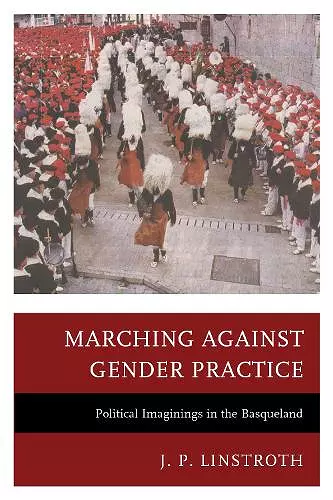Marching against Gender Practice
Political Imaginings in the Basqueland
Format:Hardback
Publisher:Lexington Books
Published:30th Oct '15
Currently unavailable, and unfortunately no date known when it will be back

Marching against Gender Practice: Political Imaginings in the Basqueland begins with the question: why is it so problematic for the majority of people in the Basque town of Hondarribia to accept the broader participation of women in their annual military march known as the Alarde? To explain this dispute, this study examines local history as well as the history of this unique parade, but most importantly considers how gender practices were and are organized. The controversy to extend female involvement in the Alarde resulted in two positions between betikoak traditionalists, (Betiko Alardearen Aldekoak, “Always the Town’s Alarde”), and local “feminists” (emakumealdekoak or Emakumeak JuanaMugarrietakoa, the Women of Mugarrietakoa, WJM), the former group wishing to preserve the ritual and the latter wanting to change it. These are not simply dichotomous stances but represent multiple levels of local identity through differing concepts of gender, history, and social experience. It will be shown throughout the Alarde’s long history (1639-present) that it represents several periods of militarism from the town’s defense in 1638 against French forces, Napoleonic resistance (1808-1813) to the Carlist Wars (1833-1840 and 1872-1876). The Alarde began as a religious procession and gradually incorporated more and more secular elements. In essence, by the end of the nineteenth century and beginning of the twentieth century, the Alarde became one of many “Basque celebrations” (Euskal jaiak), tying it to Basque nationalism. Marching against Gender Practice centers on gender analyses of two opposing gender worldviews between the betikoak traditionalists and WJM feminists, but it aims at being applicable to gender theories in general, especially how gender may be cognized and what cognitive processes and cognitive systems may be included in the cognition of gender. By implication, it is asserted that collective imagination is not an immutable or static concept but may represent locality, regionalism, and nationalism as well as imbue concepts of communality, individuality, gender, harmony, historical narration, memory, social organization, and tradition. Commemorative, historical or re-enactment rituals like the Alarde of Hondarribia explain the duration of local identity, its transformation over time, and newer expressions of identity, which are continually being contested and reaffirmed through collective imagination.
A timely rethinking of gender and ritual in relation to recent approaches to memory, cognition, and ‘the past in the present.’ Linstroth delves beneath the calm surface of everyday life to reveal some of the key tensions expressed in competing views of gender and historical memory. This study will resonate well beyond its ethnographic context. -- David E. Sutton, Southern Illinois University Carbondale
ISBN: 9780739125212
Dimensions: 237mm x 159mm x 28mm
Weight: 608g
318 pages